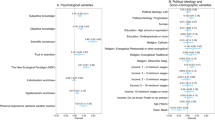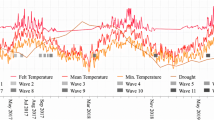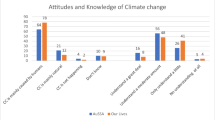Abstract
Using longitudinal data from two household surveys in 2017 and 2019, we analyze attitudes toward climate change and climate policy in Germany. We find that nearly 20% of respondents state that they do not believe in climate change, and more than 30% are doubtful that climate change is mainly caused by human action. Moreover, we detect that political orientation is strongly correlated with these attitudes, as respondents inclined to Germany’s right-wing populist party AfD are substantially more climate-skeptical and object to climate policies more frequently. Even though our results show that climate change skepticism increased between 2017 and 2019, coinciding with the rise of the Fridays for Future movement, AfD voters did not move further away from the average respondent during this period. Moreover, fixed-effects estimations show that the climate attitudes of voters who switch to AfD during the study period hardly change, indicating that the orientation towards the AfD does not change climate attitudes. Instead, AfD might attract people who were already climate skeptical.







Similar content being viewed by others
Notes
We use the terms climate skepticism and climate denial interchangeably as they are both used in the literature. However, there is a debate whether climate skepticism is an accurate term (see Björnberg et al. 2017).
We refer to the AfD as a right-wing populist party, as this is the common formulation and is considered appropriate, even if the term is not clearly defined (Jesse and Panreck 2017). See also Häusler (2018) for a debate on the political classification of the AfD.
For the full set of questions and our selection, see Table A3 in the appendix.
The results of the probit estimations are available upon request.
Tables A8–A14 in the appendix show the regression tables including the number of observations and the adjusted R2 for this and all other models whose graphical results are presented in this paper.
As a robustness check, we include pro-environmental attitudes in the regression. Unsurprisingly, these are strongly associated with climate change scepticism as shown in Table A8, but the inclusion of this variable has little bearing on the remaining coefficients. Yet, as pro-environmental attitudes might be endogenous, we have decided to omit it for the main analysis.
For our main outcomes, we illustrate the agreement rates for each party (see Figs. 2, A1, and A4).
Beside political orientation the residence seems to play a major role for the support of carbon taxes. Respondents in rural areas are about 8 percentage points less likely to support a carbon tax compared to respondents who reside in urban areas (Table A11). This finding emphasizes difficulties for the implementation of a carbon tax owed to a rural–urban divide, as also documented by Douenne and Fabre (2020). Similarly, rural respondents are less likely support the promotion of green electricity and the coal phase-out, but the differences are more modest.
References
AfD (2016). Grundsatzprogramm Alternative für Deutschland. URL: https://cdn.afd.tools/wp-content/uploads/sites/111/2018/01/Programm_AfD_Online-PDF_150616.pdf.
Anderegg WR, Prall JW, Harold J, Schneider SH (2010) Expert credibility in climate change. Proc Natl Acad Sci 107(27):12107–12109
Anderson ST, Marinescu I, Shor B (2019) Can Pigou at the polls stop us melting the poles? National Bureau of Economic Research.
Andor MA, Schmidt CM, Sommer S (2018) Climate change, population ageing and public spending: evidence on individual preferences. Ecol Econ 151:173–183
Björnberg KE, Karlsson M, Gilek M, Hansson SO (2017) Climate and environmental science denial: a review of the scientific literature published in 1990–2015. J Clean Prod 167:229–241
Bonikowski B (2017) Ethno-nationalist populism and the mobilization of collective resentment. Br J Sociol 68:S181–S213
Cronbach LJ (1951) Coefficient alpha and the internal structure of tests. Psychometrika 16(3):297–334
Destatis, (2020) Haushalte und familien. Ergebnisse des Mikrozensus. Bundesamt für Statistik, Wiesbaden
Diekmann A, Preisendörfer P (2001) Umweltsoziologie. Eine Einführung. Reinbek bei Hamburg, Rowohlt
Dilling M (2018) Two of the same kind? Ger Polit Soc 36(1):84–104
Douenne T, Fabre A (2020) French attitudes on climate change, carbon taxation and other climate policies. Ecol Econ 169:106496
Drews S, Savin I, Van Den Bergh JC (2022) Biased perceptions of other people’s attitudes to carbon taxation. Energy Policy 167:113051
EC (2019). Special Eurobarometer 490. Climate change. European Commission, Brussels
Edenhofer O, Kalkuhl M, Ockenfels A (2020) Das Klimaschutzprogramm der Bundesregierung: Eine Wende der deutschen Klimapolitik? Perspekt Wirtsch 21(1):4–18
Engels A, Hüther O, Schäfer M, Held H (2013) Public climate-change skepticism, energy preferences and political participation. Glob Environ Change 23(5):1018
ESS (2018) Einstellungen zum Thema Klimawandel und Energie in Europa: Ergebnisse der 8. Runde des European Social Survey, London
Ewald J, Sterner T, Sterner E (2021) Understanding the resistance to carbon taxes. Resources for the future working paper. pp 21–18
Forchtner B, Kroneder A, Wetzel D (2018) Being skeptical? Exploring far-right climate-change communication in Germany. Environ Commun 12(5):589–604
Fraune C, Knodt M (2018) Sustainable energy transformations in an age of populism, post-truth politics, and local resistance. Energy Res Soc Sci 43:1–7
Goulder LH (2020) Timing is everything: how economists can better address the urgency of stronger climate policy. Rev Environ Econ Policy 14(1):143–156
Hammar H, Lofgren A, Sterner T (2004) Political economy obstacles to fuel taxation. Energy J. https://doi.org/10.5547/ISSN0195-6574-EJ-Vol25-No3-1
Häusler, A. (2018). Die AFD: Partei des völkisch-autoritären Populismus. Völkisch-autoritärer Populismus. Der Rechtsruck in Deutschland und die AfD, 9–19.
Hobson K, Niemeyer S (2013) “What sceptics believe”: the effects of information and deliberation on climate change scepticism. Public Underst Sci 22(4):396–412
Hornsey MJ, Harris EA, Bain PG, Fielding KS (2016) Meta-analyses of the determinants and outcomes of belief in climate change. Nat Clim Chang 6(6):622–626
Huber RA (2020) The role of populist attitudes in explaining climate change skepticism and support for environmental protection. Environ Politics 29(6):959–982
Huber RA, Fesenfeld L, Bernauer T (2020) Political populism, responsiveness, and public support for climate mitigation. Climate Policy 20(3):373–386
Huber RA, Greussing E, Eberl JM (2021) From populism to climate scepticism: the role of institutional trust and attitudes towards science. Environ Politics. https://doi.org/10.1080/09644016.2021.1978200
Hulme M (2016) 1.5 C and climate research after the Paris agreement. Nat Clim Change 6(3):222–224
IPCC (2022) Climate change 2022. Mitigation of climate change. Working group III contribution to the sixth assessment report of the intergovernmental panel on climate change. Summary for policymakers. Intergovernmental panel on climate change
Jesse E, Panreck I (2017) Populismus und Extremismus: Terminologische Abgrenzung – das Beispiel der AfD. Zeitschrift Für Politik 64(1):59–76
Kahan DM, Peters E, Wittlin M, Slovic P, Ouellette LL, Braman D, Mandel G (2012) The polarizing impact of science literacy and numeracy on perceived climate change risks. Nat Clim Change 2(10):732–735
Kahan DM, Peters E, Wittlin M, Slovic P, Ouellette LL, Braman D, Mandel G (2012) The polarizing impact of science literacy and numeracy on perceived climate change risks. Nat Clim Chang 2(10):732–735
Kulin J, Sevä IJ, Dunlap RE (2021) Nationalist ideology, rightwing populism, and public views about climate change in Europe. Environ Politics. https://doi.org/10.1080/09644016.2021.1898879
Lamb WF, Mattioli G, Levi S, Timmons Roberts J, Capstick S, Creutzig F, Minx JC, Müller-Hansen F, Culhane T, Steinberger JK (2020) Discourses of climate delay. Global Sustain 3(17):1–5
Le Quéré C, Peters GP, Friedlingstein P et al (2021) Fossil CO2 emissions in the post-COVID-19 era. Nat Clim Chang 11:197–199
Leiserowitz A, Maibach E, Rosenthal S, Kotcher J, Bergquist P, Ballew MT, Gustafson A (2020) Climate change in the American mind
Levi S (2021) Why hate carbon taxes? Machine learning evidence on the roles of personal responsibility, trust, revenue recycling, and other factors across 23 European countries. Energy Res Soc Sci 73:101883
Liu PR, Raftery AE (2021) Country-based rate of emissions reductions should increase by 80% beyond nationally determined contributions to meet the 2 C target. Commun Earth Environ 2(1):1–10
Lockwood M (2018) Right-wing populism and the climate change agenda: exploring the linkages. Environ Politics 27(4):712–732
McCright AM, Dunlap RE (2011) Cool dudes: The denial of climate change among conservative white males in the United States. Glob Environ Chang 21(4):1163–1172
Motta M (2018) The dynamics and political implications of anti-intellectualism in the United States. Am Politics Res 46(3):465–498
Myers TA, Maibach EW, Roser-Renouf C, Akerlof K, Leiserowitz AA (2013) The relationship between personal experience and belief in the reality of global warming. Nat Clim Chang 3(4):343–347
Nestler C, Rohgalf J (2014) Eine deutsche Angst – Erfolgreiche Parteien rechts von der Union: Zur AfD und den gegenwärtigen Gelegenheitsstrukturen des Parteienwettbewerbs. Zeitschrift Für Politik 61(4):389–413
Oei P, Hermann H, Herpich P, Holtemöller O, Lünenbürger B, Schult C (2020) Coal phase-out in Germany—Implications and policies for affected regions. Energy 196:117004
Peterson RA (1994) A meta-analysis of Cronbach’s coefficient alpha. J Consum Res 21(2):381–391
Pew Research Center (2020) Americans see spread of disease as top international threat, along with terrorism, nuclear weapons, cyberattacks
Poortinga W, Spence A, Whitmarsh L, Capstick S, Pidgeon NF (2011) Uncertain climate: an investigation into public scepticism about anthropogenic climate change. Glob Environ Chang 21(3):1015–1024
Rafaty R (2018) Perceptions of corruption, political distrust, and the weakening of climate policy. Glob Environ Politics 18(3):106–129
Rahmstorf S (2004) The climate sceptics. Potsdam: Potsdam Institute for Climate Impact Research
Rogelj J, Den Elzen M, Höhne N, Fransen T, Fekete H, Winkler H, Meinshausen M (2016) Paris agreement climate proposals need a boost to keep warming well below 2 C. Nature 534(7609):631–639
RTL (2017) Sonntagsfrage: poll results from RTL/n-tv-Trendbarometer conducted by forsa between July 10 and 14 2017. URL: https://www.wahlrecht.de/umfragen/forsa.htm.
Smith EK, Mayer A (2018) A social trap for the climate? Collective action, trust and climate change risk perception in 35 countries. Glob Environ Chang 49:140–153
Sommer S, Mattauch L, Pahle M (2022) Supporting carbon taxes: the role of fairness. Ecol Econ 195:107359
Steentjes K, Pidgeon N, Poortinga W, Corner A, Arnold A, Böhm G, Mays C, Poumadère M, Ruddat M, Scheer D, Sonnberger M, Tvinnereim E (2017) European Perceptions of Climate Change: topline findings of a survey conducted in four European countries in 2016. Cardiff University, Cardiff
Sturm G (2020) Populismus und klimaschutz der afd-klimadiskurs. Soziologiemagazin 2–2020:69–92
Tomberg L, Stegen KS, Vance C (2020) “The mother of all political problems”? On asylum seekers and elections. Eur J Pol Econ 67:101981
Tranter B, Booth K (2015) Scepticism in a changing climate: a cross-national study. Glob Environ Chang 33:154–164
Van der Linden S (2015) The social-psychological determinants of climate change risk perceptions: towards a comprehensive model. J Environ Psychol 41:112–124
Van Rensburg W (2015) Climate change scepticism: a conceptual re-evaluation. SAGE Open 5(2):2158244015579723
Van Hauwaert SM, Van Kessel S (2018) Beyond protest and discontent: a cross-national analysis of the effect of populist attitudes and issue positions on populist party support. Eur J Polit Res 57(1):68–92
Whitmarsh L (2011) Scepticism and uncertainty about climate change: dimensions, determinants and change over time. Glob Environ Chang 21(2):690–700
Yan P, Schroeder R, Stier S (2021) Is there a link between climate change scepticism and populism? An analysis of web tracking and survey data from Europe and the US. Inf Commun Soc 25:1400
Acknowledgements
We thank Mark A. Andor, Thomas K. Bauer, Gunter Bensch, Linus Mattauch, Jörg Peters, Christoph M. Schmidt, Maxie Sievert, and Vance, as well as participants of the 27th Annual Conference of the European Association of Environmental and Resource Economists for very helpful discussions and comments. Moreover, we are grateful to Marielena Krieg and Valerie Peetz for excellent research assistance. We gratefully acknowledge financial support by the German Ministry for Education and Research (BMBF) in the project Ariadne (grant 3SFK5C0).
Author information
Authors and Affiliations
Corresponding author
Additional information
Publisher's Note
Springer Nature remains neutral with regard to jurisdictional claims in published maps and institutional affiliations.
Supplementary Information
Below is the link to the electronic supplementary material.
Rights and permissions
Springer Nature or its licensor (e.g. a society or other partner) holds exclusive rights to this article under a publishing agreement with the author(s) or other rightsholder(s); author self-archiving of the accepted manuscript version of this article is solely governed by the terms of such publishing agreement and applicable law.
About this article
Cite this article
Knollenborg, L., Sommer, S. Diverging Beliefs on Climate Change and Climate Policy: The Role of Political Orientation. Environ Resource Econ 84, 1031–1049 (2023). https://doi.org/10.1007/s10640-022-00747-1
Accepted:
Published:
Issue Date:
DOI: https://doi.org/10.1007/s10640-022-00747-1




